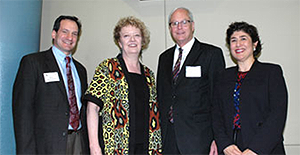Employee philanthropists thanked at luncheon
From left, Matt Wasserman, vice chancellor for development at CU Denver; professor Sonja Foss; professor emeritus Peter Bryant; and Lori Goldstein, senior director of gift planning at CU Denver.
If you want to make your time at CU Denver even more rewarding than it already is, consider giving back in any manner you can.
That was the message delivered at the Office of Development's CU Denver Faculty/Staff/Retiree luncheon on April 25. The annual event celebrates university employees who give back to the institution through estate gifts, donations, payroll deductions and other ways.
More than 80 people attended the Terrace Room lunch that honored faculty, staff and retirees for giving not only of their professional energy, but their financial resources, to the institution. Two faculty who have contributed generously— professor emeritus Peter Bryant, Ph.D., and professor Sonja Foss, Ph.D. — explained why philanthropy matters and encouraged the university community to give back.
Chancellor Don Elliman welcomed the gathering and thanked everyone for their support of CU Denver. "We're here to celebrate how some people have gone to extraordinary lengths to give back not only of their time, but of their treasure, and for that we are obviously very grateful," he said.
Matt Wasserman, vice chancellor for development at CU Denver, said CU Denver has seen "incredible growth over the last five years" in philanthropy, which has translated into more scholarships and programs for students. "In this day and age of declining state funding, philanthropy can really move the needle and bring great things to CU Denver," he said.
Two faculty members who've consistently worked to improve the lives of students, through both their teaching and philanthropy, are Bryant and Foss.
Bryant, who started teaching in the CU Denver Business School in 1981, said that "building a new and greater institution is complicated, but history proves it's possible." He read passages from the book, "When MIT was Boston Tech," to illustrate his point.
Bryant, who is now retired but works part time in the Ombuds Office, acknowledged that he has sometimes struggled to embrace change. "Changes like more and younger undergraduates, campus consolidations and rearrangements, new funding sources," he said. "These changes are hard, but they're good."
He said it's usually more fun to be a part of the change—for him it was being part of the team that launched the University Honors and Leadership Program—than to sit back and watch it happen. "There must be 100 initiatives going on like that around here," Bryant said. "Which one might you get enthusiastic about? Think about it. Think about your resources, time, passion, money, expertise. And find a way to give some of them back to CU Denver on a continuing basis."
Foss, a professor in the Department of Communications, College of Liberal Arts and Sciences, used an analogy to describe CU Denver as being a "pirate ship" as opposed to having the heft of the flagship. "We are nimble and we can do things with our resources that are innovative," she said. She has set up a bequest in the Department of Communications to fund graduate student travel and research.
Philanthropy is about leaving a lasting impression on the lives of CU Denver students as well as improving the overall institution, Foss noted. "All of us benefit from the booty that we share with all of the hands on this pirate ship of ours," she said. "It helps all of our departments and the university as a whole be a place where we want to be."
Lori Goldstein, senior director of gift planning at CU Denver, said the university has about 40 recorded estate gifts, also known as legacy gifts, that will ultimately benefit CU Denver. "That's the tip of the iceberg, because by far the majority of people who leave a legacy gift don't tell us about it," she said. "Of this select group of people who have confirmed their legacy gifts, almost half are present or past staff and faculty. ... Even if you are not, or are not yet, one of the employees who give personally, it's likely that you work with or know or have known some of the people who do."
Wasserman emphasized that "every gift has an impact—no matter how large or small." The Office of Development is happy to help employees learn of opportunities for giving to CU Denver.


